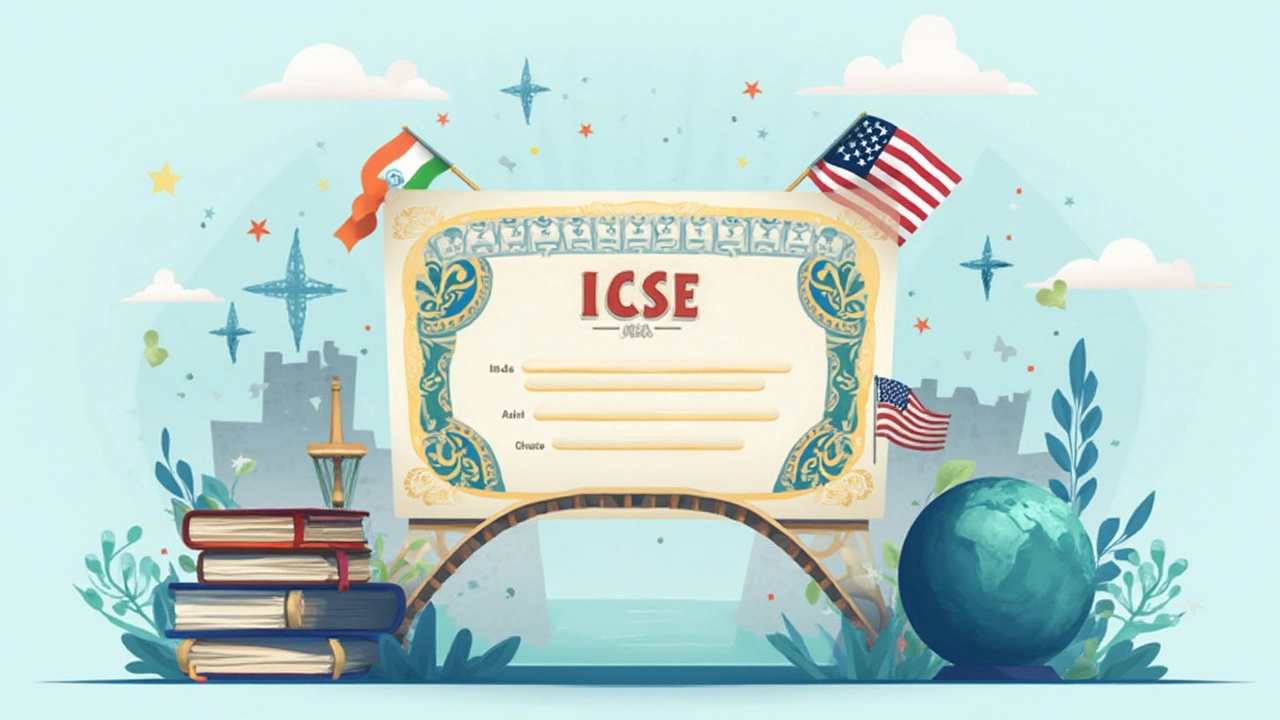If you're considering a move from the Indian education system to the USA, you might be wondering where the ICSE board stands in terms of acceptance. Here's the lowdown: ICSE, or the Indian Certificate of Secondary Education, is recognized by many schools and colleges in the US. However, the process isn't always straightforward. The key is understanding how it compares to other boards like CBSE and what steps you may need to take for smooth recognition.
Why the fuss about ICSE? Unlike CBSE, ICSE has a more detailed curriculum, especially in areas like English and environmental education. Schools in America appreciate the depth, but they might require you to prove the equivalency of your education. Each institution might have its own rules, so it's crucial to do some homework beforehand. Stick around for more insights and tips on navigating this educational transition smoothly!
- What is the ICSE Board?
- How ICSE Compares with CBSE
- Recognition of ICSE in the USA
- Equivalence and Credit Transfers
- Tips for ICSE Students Eyeing the USA
What is the ICSE Board?
The ICSE, or Indian Certificate of Secondary Education, is an examination conducted by the Council for the Indian School Certificate Examinations (CISCE). Established in 1958, it's a well-known board in India recognized for its comprehensive and diverse curriculum.
The ICSE board places a significant emphasis on a strong foundation in English, along with a balanced focus on all subjects, ensuring a holistic education. This makes it unique compared to other boards like CBSE, which is more focused on core subjects and is often considered more suitable for students aiming for engineering or medical fields.
ICSE's syllabus is designed to prepare students for a global stage, fostering critical thinking and analytical skills. This is particularly appealing to students who wish to pursue education in countries like the USA, where these skills are highly valued. Plus, ICSE allows for a variety of subjects to be taken, supporting students’ varied interests. It encourages in-depth learning, creativity, and practical knowledge.
Here's an interesting tidbit: ICSE exams usually occur in English, which can be a huge plus for those eyeing studies abroad, as it helps students get comfortable with an international language early on.
How ICSE Compares with CBSE
Diving into the debate of CBSE vs ICSE often feels like opening a can of worms. Each board has its strengths, but let's break it down a bit.
The ICSE board is known for its rigorous and detailed syllabus, particularly shining in subjects like English and social sciences. This depth can be really beneficial for students who love to explore subjects at length. It's like an educational buffet where you get a taste of everything, enabling a broad knowledge base, which can be super handy later on.
On the flip side, CBSE has a curriculum that’s more streamlined, focusing on core subjects like Mathematics and Science. This is particularly helpful if you’re aiming for entrance exams or technical fields, as it tends to align with national level assessments in India.
When it comes to marking, the ICSE evaluation system is often considered relatively strict, which can sometimes mean lower percentages compared to CBSE. But hey, don’t stress about the percentages too much! Most universities look beyond just numbers.
In terms of global recognition, both boards carry weight, but the approach can differ. Many international schools in the USA recognize CBSE credentials readily. However, ICSE validity in the USA is appreciated, considering its detailed coursework in areas like environmental education.
So, which one's better? There’s no straight answer here, as both are respected globally. Choosing between ICSE and CBSE ultimately comes down to your learning style and future plans. If you prefer an all-encompassing syllabus with a focus on English, ICSE might be your call. But if you’re leaning towards competitive exams, CBSE could be the way to go.

Recognition of ICSE in the USA
So, how does your ICSE certificate hold up in the Land of the Free? Well, many American colleges and universities do acknowledge the ICSE syllabus as comparable to their high school diploma. Yet, the buck doesn’t stop here. Each educational institution in the USA might evaluate it differently.
Generally, the recognition process involves a thorough evaluation of your transcripts. Schools might look at your marks, evaluate your subjects, and sometimes even translate your grades into their grading scale. It’s like turning rupees into dollars - it requires conversion and sometimes some additional math! Educational credential evaluators in the US can help with this. They examine and attest your ICSE credentials, making your transition smoother.
A pro tip: while most universities are on board with accepting ICSE, always check with your particular school beforehand. Reach out to their admissions office or check their website for details on international education requirements. This ensures no surprises down the road.
But wait, there's more! If you're considering schools belonging to the Ivy League or other prestigious universities, your ICSE achievements could serve you well. These schools appreciate the rigor and depth of the ICSE curriculum, especially if you've excelled in subjects like English, Mathematics, or Science.
To sum it up, recognizing your ICSE certification in the USA is quite doable. It might require a few extra steps, like getting your transcript evaluated or chatting with admissions. But hey, if crossing the Pacific wasn't daunting enough, this hurdle will feel like a breeze!
Equivalence and Credit Transfers
Navigating the world of educational systems can be tricky, especially when you're trying to figure out how ICSE coursework stacks up in the USA. For ICSE students, ensuring your hard-earned credits are recognized across the pond involves a bit of legwork—but it's totally doable!
First off, you gotta know that each U.S. college or high school might have its own set of rules for assessing international transcripts, and it typically starts with establishing equivalence. Typically, you'll need a course-by-course evaluation from an accredited agency. Some well-known agencies include World Education Services (WES) and Educational Credential Evaluators (ECE). They’ll analyze your ICSE marks and convert them to the U.S. grade scale.
Once you have that evaluation, it might feel like you’ve conquered a big chunk of the Everest, but here's a tip: always chat with the admissions office of the school you're aiming for. They'll guide you on their specific requirements and any additional paperwork you might need. In many cases, they'll consider your ICSE validity in USA pretty favorably, thanks to its rigorous curriculum.
This whole credit transfer business is also about patience and paperwork, so having your documents in order is crucial. Here’s a quick checklist to ensure you're on the right path:
- Obtain certified copies of your ICSE transcripts.
- Get your documents evaluated by a recognized credential evaluation service.
- Reach out to your target schools’ admissions offices for specific advice.
- Keep copies of every document, email, and form you submit or receive.
Feeling overwhelmed? Remember, many students have as successfully made the leap, and with a little planning, you'll be able to as well. Colleges and universities in the USA recognize the quality and depth of ICSE education, and with the right steps, you’ll be striding towards your academic dreams in no time.

Tips for ICSE Students Eyeing the USA
If you’re an ICSE student planning to study in the USA, I've got some tips to make your journey smoother. You might think it’s a big jump, but with the right steps, you can make it hassle-free.
First up, get your ICSE transcripts evaluated. This is essential because American universities need to understand your academic background. Services like World Education Services (WES) or Educational Credential Evaluators (ECE) are popular choices for transcript evaluation. They convert your grades to the US GPA system, so schools can compare your achievements with local students.
Next, prepare for standardized tests. While your ICSE background is strong, most US colleges require SAT or ACT scores. It's a good idea to start prepping early and familiarize yourself with the format. And don't forget about English proficiency tests like TOEFL or IELTS since they're often a must if your education was in a non-English medium.
- Check application requirements: Every college has its own criteria, so make a list of the ones you're interested in and check their prerequisites.
- Look for ICSE-friendly schools: Some universities recognize ICSE more readily than others. Try to find schools with a history of accepting students from Indian boards.
- Seek out scholarships: Studying abroad is pricey, so search for scholarships specifically for international or Indian education in USA students. Many are available if you dig a little.
Lastly, try reaching out to alumni or student bodies from the schools you’re interested in. They can offer first-hand insights and might give you a heads-up on what to expect.
By following these steps, you'll be better prepared to tackle the application process and make your educational transition to the USA much smoother. Remember, preparation is key, so take your time, and don’t rush it!
